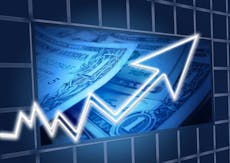The Best Brokers for Commodity Trading in 2026
All products and services featured are independently selected by WikiJob. When you register or purchase through links on this page, we may earn a commission.
Best Brokers for Commodity Trading
Commodity trading has existed for thousands of years, with goods such as crops and livestock forming the very first stock exchange.
Today, commodity trading involves financial products such as futures contracts and derivatives.
The practice, as old as civilization itself, has come a long way in recent years. As well as the upgrade from trading wheat and goats, traders have also done away with clay tablets to keep track of imports and exports.
In the 21st century, trading firms or individuals use commodity brokers to buy or sell contracts on their behalf.
As brokers earn a commission on every trade they make, earning money for their clients is their main goal. But how do you choose a broker?
In this guide, we will delve into the subject of commodity trading and take a look at how you can choose the best commodity broker for all your trading needs.
What Is The Best Online Broker For Commodities?
If you are someone who is starting out in commodity trading, there are many brokers at your fingertips.
With plenty of choices also comes a tricky decision, as you must choose the best commodity broker to meet your needs.
To help you make an informed choice, we have rounded up some of the top brokers in the world. In this section, we will introduce a range of brokers — also listing their advantages and disadvantages when it comes to trading.
With our commodity brokers list, you can choose the best broker for you.
1. Plus500
Pros
- No buy/sell commissions and tight spreads
- Leverage of up to 1:30
- FREE unlimited Demo
- 2,800+ trading instruments
- Real-time quotes and advanced analytical tools
- Fast and reliable order execution
Cons
- No API integrations
- No social copy trading
Plus500 was founded in Israel in 2008; therefore, while it is regulated, it has yet to survive a recession.
The educational resources are not as good as other forex brokers, and the platforms lack when it comes to research and analysis.
It is user-friendly and easy to set up an account, however.
Beginners are always advised to start with a demo account since trading CFDs is a risky activity, Plus500 is not suitable for pure beginners.
2. Pepperstone
Pros
- Extensively regulated
- No minimum deposit
- Low fees and mostly free withdrawals
- Good customer service
Cons
- No investor protection for clients outside UK, EU and EEA
- Withdrawal fee for international bank wires
- CFDs only
Pepperstone is an Australian-based forex broker established in 2010 that shines as a premier brokerage destination for commodity trading enthusiasts, offering a seamless blend of cutting-edge technology and unparalleled market access.
With a robust platform tailored for commodity traders, Pepperstone empowers investors with lightning-fast execution, comprehensive market insights, and a diverse range of commodities spanning energy, metals, and agricultural products.
Pepperstone has a proprietary platform (cTrader and TradingView) and provides access to MT4 and MT5, where you can trade 61 forex pairs and more than 1,000 CFDs, including ETF CFDs, on either web, desktop or mobile.
In addition, it is well-regulated by ASIC, FCA, DFSA, CySEC, BaFIN, SCB and CMA.
Backed by a commitment to transparency and reliability, Pepperstone emerges as the trusted ally for navigating the dynamic world of commodity trading with confidence and precision.
To find out more, read our Pepperstone review.
3. eToro
Pros
- Easy to begin your investment journey
- No fees
- Access to a huge social trading platform
Cons
- They charge for withdrawals
- There is a penalty for inactivity
- Its simplicity may hold you back
Founded in 2007, eToro is a worldwide investment company that provides traders and investors with access to more than 3,000 financial assets, including stocks, currencies, cryptocurrencies, and of course, commodities.
For beginners looking to start trading in commodities, eToro offers ready-made investment portfolios that group assets into categories. Having a broker gather commodities into a portfolio can make it much easier to begin trading.
You can benefit from 0% fees with eToro when opening a long, non-leveraged position on a stock or ETF. That means no management fees, rollover fees, ticket fees or additional broker fees. When your goal is to make money, not having to spend cash on fees is an enticing advantage.
While you can benefit from 0% fees, there is a $5 fee for withdrawals. What’s more, FX fees apply on non-USD deposits and withdrawals.
If you are planning to be more of a casual trader, eToro may not be the ideal broker for you. If you do not log into your account for over one year, eToro will begin charging an inactivity fee. At $10 a month, this penalty would eat into your available balance until you log in again.
eToro is the world’s largest community of traders and investors, allowing you to connect with more than 30 million like-minded shareholders. Thanks to a social media-style News Feed, you can interact, share ideas and network with fellow traders.
This broker is known for being easy to use, especially for beginners, but more experienced traders may be at a disadvantage. The eToro platform is not as advanced or customizable as some other brokers, so it may not be suitable if you are looking to have more control over your trading strategies.
61% of retail investor accounts lose money when trading CFDs with eToro. You should consider whether you understand how CFDs work, and whether you can afford to take the high risk of losing your money.
4. IG
Pros
- Highly regulated
- MetaTrader 4 (MT4)
- Over 10,000 instruments
- Available in the UK and US
- 24/7 customer support
Cons
- High fees
- No deposit compensation scheme for US accounts
- No copy trading
- Inactivity fees
IG is a great share trading platform for beginners thanks to its user-friendly interface and extensive educational resources.
Pros of IG include a wide range of trading instruments and markets, as well as the ability to access multiple account types and trading platforms. The platform also offers a demo account for beginners to practise trading strategies before investing real money.
However, IG isn’t the cheapest share trading platform, with relatively high trading fees and a minimum deposit requirement of £250 when paying by credit/debit card or PayPal.
In terms of additional fees, IG charges a commission fee for share trading, starting from £8 per trade. There’s also a custody fee of 0.25% per year for holdings of £250 or more.
Overall, IG is a solid choice for beginners looking for a user-friendly platform with extensive educational resources, but investors should be aware of its fees and minimum deposit requirements.
5. AvaTrade
Pros
- Highly regulated
- Free deposit and withdrawal
- No commission
- Low minimum deposit
- Social and copy trading
Cons
- Not available for US clients
- Inactivity fees
AvaTrade is frequently considered one of the best brokers for commodity trading for several reasons that cater to the needs of both novice and experienced traders.
AvaTrade offers traders the opportunity to trade a variety of commodities, including precious metals like gold and silver, energy commodities like oil and natural gas, and agricultural products like coffee and sugar.
This diversity allows traders to choose commodities that best fit their trading strategy and market interests.
Commodities at AvaTrade are primarily traded as CFDs (Contracts for Difference). This means traders can speculate on the price movements of commodities without actually owning the physical product. CFD trading provides the flexibility to profit from both rising and falling markets.
AvaTrade provides access to several trading platforms, including MetaTrader 4 and 5, and their proprietary mobile app, AvaTradeGo. These platforms are equipped with advanced tools and features necessary for effective commodity trading, such as real-time charts, technical analysis tools, and automated trading capabilities.
AvaTrade is regulated in several jurisdictions around the world. This regulatory oversight provides a secure trading environment and adds a level of trust and credibility to the broker.
6. Saxo
Pros
- Heavily regulated
- Good product portfolio
- Low forex fees
- No withdrawal or inactivity fees
Cons
- Does not accept US clients
- High fees for options, futures and bonds
Saxo is a formidable platform for trading commodities, offering extensive tools and options that cater to various trading strategies.
Saxo offers a diverse array of commodities trading options. Traders can engage with commodities as CFDs, futures, options, spot pairs, or even exchange-traded commodities (ETCs). This variety allows traders to choose the instruments that best suit their trading style and risk tolerance.
Saxo provides significant flexibility in how commodities are traded. Traders can go long or short, allowing them to profit from both rising and falling markets. Additionally, Saxo supports hedging strategies, which are essential for managing risk in volatile commodity markets. For those with a longer-term perspective, investing in commodities as a hedge against inflation or other economic variables is also a viable strategy.
Saxo allows trading across all major commodities, including energy sources like oil and natural gas, precious metals such as gold and silver, and agricultural goods like coffee and sugar. The availability of options and futures on these commodities enables traders to leverage their positions and enhance potential returns.
Saxo's platforms, such as SaxoTraderGO and SaxoTraderPRO, provide advanced charting tools, comprehensive market data, and intuitive trading interfaces. These features are crucial for tracking commodity markets, analyzing trends, and executing trades efficiently.
Saxo offers an abundance of educational resources and analytical tools. These resources are designed to help traders make informed decisions by providing insights into market trends, economic indicators, and commodity-specific news.
Trading with a globally regulated broker like Saxo ensures that commodity trading is conducted within a secure and transparent environment. This is particularly important in the often complex and highly leveraged world of commodity trading.
7. Interactive Brokers
Pros
- Low fees
- Advanced trading technology at your fingertips
- Access to educational resources
Cons
- Novice traders may find it too complex
- High minimum deposit required
- Limited customer contact options
Based in the US, an online brokerage firm Interactive Brokers was founded in 1978.
It provides electronic trading platforms for individuals and organizations — allowing them to trade assets such as stocks, options, futures, forex, funds and bonds.
Its extensive range of tradable assets has seen Interactive Brokers grow to be one of the world’s largest online brokers.
InteractiveBrokers offers some of the lowest trading fees, with no account maintenance fees.
To open an account, you must deposit a minimum of $10,000. This condition may be a barrier to new traders who wish to start with low-commitment trading.
Interactive Brokers uses the Trader Workstation (TWS) platform, which is highly advanced and customizable to meet your needs. With TWS, you can create your own trading strategies and automate your trades.
Trader Workstation can be too advanced for beginner traders. While it can be a brilliant tool, it can take time to get used to and may be overwhelming for new traders.
Trading with Interactive Brokers also gives you access to training materials, such as webinars and tutorials to learn more about trading. Interactive Brokers even have a training academy where you can gain knowledge of the markets and improve your trading skills.
InteractiveBrokers does provide 24/7 customer support, but this is limited to get in touch via email and phone. Unlike other traders, Interactive Brokers does not offer live chat or online help.

What Is a Commodity?
Simply put, a commodity is a basic good or raw material, such as metals or agricultural products, that is traded in large quantities.
They are goods that have been mined, grown, reared or processed. These natural resources are then used to create a more complex good.
Physical commodities include:
- Oil
- Gold
- Copper
- Aluminium
- Sugar
- Wheat
- Corn
- Soybeans
Commodities are the building blocks that make up the global economy. The difference between commodities and other goods is that they’re standardized and interchangeable.
This means that two equivalent units of the same commodity will be pretty much identical, no matter where they’re produced.
For example, an ounce of gold from Brazil will be the same as an ounce of gold from an Australian mine.
Why Trade in Commodities?
Commodities have been traded for thousands of years. These were, in the past, traded physically.
Now, however, they are traded on exchanges, such as the London Metal Exchange and Chicago Mercantile Exchange.
To trade commodities, investors need to have an account with a trading platform that offers commodity markets.
There are numerous advantages to trading in commodities. While the market can be very volatile, this can be an advantage as it allows for plenty of opportunities for buying and selling commodities.
In addition, there is very rarely a significant reduction in the demand for the product. The product will always have periods of lower demand, but demand will increase in the future at some point. Traders know this, and so many will buy commodities when demand is low and sell when high.
In addition, it is possible to use leverage to control a large amount of money with just a small deposit. This is an advantage because it can magnify gains. However, leverage can also increase losses.
What’s more, commodity markets are open for a large part of the week. This means that traders are not restricted and can be active on their own schedule.
Commodities tend to have a low correlation to traditional asset classes, like stocks/bonds. Therefore, this allows investors to diversify their investments to protect their funds.
It is important to note that inflation tends to lose the purchasing power of traditional currencies.
However, commodities can protect investors against inflation because their price rise during periods of high inflation.
What to Look for When Choosing the Best Commodity Broker
There are several things to look for when it comes to finding a good commodities broker. These include:
Fees
These extra costs vary between the best online commodities brokers.
When choosing a broker for commodities, you should ensure you understand how their fees work.
The type and level of fees vary between each broker, but they typically fall into two categories:
- Commissions
- Margins
Commissions are a type of fee charged by the broker for executing a trade on behalf of a client. The commission rate tends to be a percentage of the total transaction value and varies based on the size of the trade and the type of commodity being traded.
On the other hand, the term ‘margins’ refers to the amount of money that the client is required to deposit with the broker to be able to trade. You can picture margins as collateral that secures the trade.
As commodity markets can fluctuate, the broker may require additional margin if there is a significant change in the commodity value.
As well as commission and margin fees, brokers for commodities may charge other fees such as:
- Account maintenance fees – A charge for managing your investments
- Wire transfer fees – Charge for sending money domestically and internationally
- Account inactivity fees – A charge that applies to accounts that have not been used for a set period of time
Before opening an account with a broker, you should research their fees and decide whether you are willing to accept them or if there are other commodity trading brokers better suited to you.
Access to Support
This is not 24/7 with some brokers.
As a new trader, you will likely be learning about the trading industry as you go.
Some commodity trading brokers have great educational materials and even seminars you can attend to quickly get to grips with how to make investments.
Even with these resources on hand, you may still need expert help from time to time.
The level of support that brokers provide varies, with different contact options and opening hours across the board.
You may find that some brokers offer customer support via email and phone but not live chat, and some may not be available 24/7. When choosing a broker, you should think about the level of support you want to have access to.
Open to Commodities
Ensure your chosen broker trades in commodities.
Many brokers enable the trading of commodities such as oil, gold, copper, wheat, sugar and much more.
The main categories of commodities are:
- Metals
- Energy
- Agriculture
- Livestock and meat
- Soft, such as cotton and cocoa
When selecting a commodities brokerage firm, you should check that they facilitate the trading of your chosen commodity.
Trades in UK Currency
Some brokers may facilitate trades in just one currency, such as US dollars. As the world’s largest economy, it is easy to see why the US currency is such a big player in the trading industry.
While you can still make trades in dollars, you may find that the currency exchange rate from USD to GBP puts you at a disadvantage.
To make the most from your investments, opt for a commodities brokerage firm that trades in UK currency.
Minimum Deposit
Extra fees can add up.
The minimum deposit required to open an account with a broker varies across the industry.
You will find that some brokers have no minimum deposit requirement, and others require an initial payment of several thousand pounds.
The most suitable level of minimum deposit for you will depend on your personal choice. If you are new to trading and do not want to pay a lot of capital upfront, choosing a broker with a low — or no — minimum deposit is wise.
Frequently Asked Questions
A commodities broker acts as a platform between buyers and sellers of commodities such as precious metals, energy, and other raw materials. They facilitate the buying and selling of commodities on behalf of their clients.
You can use our guide to find the best commodity broker to suit your needs.
The best way to trade commodities is to decide what commodities you wish to trade. You should then select a broker that meets your needs to facilitate the trade.
The four biggest commodity traders in the world are the ABCD companies, so named due to their consecutive initials: Archer Daniels Midland (ADM), Bunge, Cargill, and Louis Dreyfus.
Some commodity brokers, including eToro, TD Ameritrade Futures and Charles Schwab, have a mobile app for trading on the go.
Commodity brokers are regulated by the federal government agency, The Commodity Futures Trading Commission (CFTC).
Among the best online brokers for commodity trading are eToro, TD Ameritrade Futures, E-Trade Futures, Charles Schwab, Trade Station and InteractiveBrokers.
One of the best commodity brokers for beginners is TD Ameritrade Futures, thanks to its offer of 24/7 customer support and a library of educational materials.
Some brokers require a low minimum deposit, such as CMC Markets, or zero commission, as is the offer from Fineco.
The following commodity brokers offer demo accounts: eToro, Trade Nation, XTB and CMC Markets.
Commodity brokers make money by charging commissions. This fee is for buying and selling orders on behalf of clients.
When choosing a commodity broker, the main factors to consider are account fees, the level of available support, the range of commodities, trading currency and minimum deposit requirements.
Final Thoughts
Above are the best brokers and options for the best commodity brokers. By following our advice and conducting further research into brokers, you can find the best option for you.
The commodity market is volatile, but there are plenty of opportunities with the commodities.
WikiJob does not provide tax, investment or financial services and advice. The information is being presented without consideration of the investment objectives, risk tolerance or financial circumstances of any specific investor, and might not be suitable for all investors. Past performance is not indicative of future results. Investing involves risk including the possible loss of principal.





